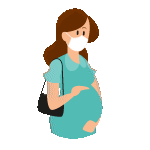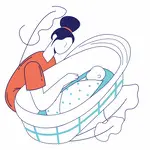Pregnancy is a roller-coaster ride filled with great anticipation, happiness, and multiple changes in your body. The body gradually changes for both the expectant mother and to accommodate the baby. Now that you are on this beautiful journey, you will have a great, life-changing experience. Therefore, it’s important to understand the three trimesters of pregnancy that will change your body with time.
Here’s a comprehensive guide for understanding the stages of development in different trimesters and at birth. Each trimester will bring a unique chapter to your beautiful pregnancy journey. We will help you understand the most significant changes in pregnancy that occur in your body, so that you can gain insight and live this journey carefully with knowledge.
First Trimester (Week 1–12)
The first trimester is when you get the good news and begin your exciting journey. Although you may not look pregnant, your body will have new experiences and enormous adjustments to accommodate the growing baby. Your first trimester will look like this:
1. Pregnancy Confirmation:
Most women discover their pregnancy in their first trimester through a home test kit or a doctor visit. This is a time of great excitement in every woman’s life. You may start thinking about your baby when you come across products like diapers and cribs.
2. Embryonic Development:
Your baby goes through enormous growth and development during the first trimester of pregnancy. This is when the vital organs and structure will form, including your baby's brain, heart, limbs, and spinal cord. A baby's major organs and external features have developed by the end of the first trimester.
3. Physical Transformations:
In addition to your baby's rapid development, you may also experience a range of physical changes. These include how you feel in the morning, such as morning sickness, and dietary changes based on your mood. The right thing to do during this time is to have an honest and open conversation with your doctor. Your first trimester is a crucial period for your baby’s health.
Early Signs of the First Trimester
- Nausea
- Morning sickness
- Constipation
- Headaches
Second Trimester (Week 13–26)
Pregnancy's second trimester is often called the honeymoon period due to the reduction of symptoms. Your body experiences a surge in energy levels during the day, and you can have a good night's sleep. Your second trimester will look like this:
1. Fetal Development:
The second trimester is when your baby undergoes remarkable growth and development. This period focuses on small, little details of growth like facial features, tiny fingernails and toenails, and the appearance of reflexes like swallowing and sucking. You can see the developed baby during your ultrasound.
2. Sensory Development:
The baby’s senses awaken during the second trimester, and they can hear the sound of your voice and feel your touch slowly in the second trimester. As their nervous system develops, they can feel external movements easily.
3. Physical Changes:
We know that the body will change in each trimester, but the second trimester brings changes that are noticeable in your body. Starting with expansion in your abdomen and growth in the uterus to accommodate the growing baby. You may also experience a pregnancy glow accompanied by radiant skin and lustrous hair. Apart from the exciting things, you may also experience slight discomfort owing to backache, leg cramps, and heartburn.
Early Symptoms of the Second Trimester
- Belly Pain
- Swollen Gums
- Bloating
- Itching Around the Belly
Third Trimester (27-Birth)
The third trimester is when you have to visit your doctor frequently. As you will be reaching the final weeks of your pregnancy soon, you need to be prepared. This period will require going through blood pressure, urine, and multiple other tests to monitor the baby’s and your health. Your third trimester will look like this:
1. Fetal Viability:
The baby reaches maximum growth in this trimester, but their organs continue to mature and they begin to accumulate fat stores. Their body starts to prepare to regulate body temperature.
2. Pelvic Pressure:
Now that you have a full-grown baby inside your body and your body is preparing for birth, you may experience pelvic pain and pressure. This can bring along back pain, pelvic heaviness, and difficulty walking or standing for long periods.
3. Emotional and Physical Preparation:
It’s natural to experience overwhelming emotions. However, you also need to prepare yourself for rushing to the hospital and delivering the baby. This period is about connecting with your partner, your inner self, and focusing on your health. How do you ensure you are fully prepared?
Here’s what you should do:
- Communication is the key - Keep open communication with your partner and gynaecologist. Communicate your preferences regarding delivery and other essential aspects of delivery. It will ensure a smooth third trimester and delivery experience.
- Pack Wisely: Organise a comprehensive bag filled with essentials for both you and your baby. These should include snacks for sustenance, nursery lingerie for comfort, chargers to stay connected, warm clothes for cosiness, and, of course, a diaper bag stocked with MamyPoko Pants Extra Absorb diapers for no leakage and Extra Clean Coco Aloe Wipes for easy cleaning.
Early Symptoms of the Third Trimester
- Backaches
- Spider Veins
- Sore Breasts
- Frequent Urination
Now that you are all set, enjoy becoming a parent and be excited about the newest member of the family.
FAQ's
Q. What are the three trimesters of pregnancy?
Ans. Pregnancy is divided into three trimesters: the first (weeks 1–12), the second (weeks 13–26), and the third (weeks 27–birth). Each trimester brings unique physical and emotional changes for both the mother and the baby, from initial pregnancy confirmation to fetal growth and final preparations for birth.
Q. What happens during the first trimester of pregnancy?
Ans. The first trimester is when vital organs and structures form in the baby, including the brain, heart, limbs, and spinal cord. The mother may experience nausea, morning sickness, constipation, and headaches. This period is crucial for the baby’s health, so regular doctor visits and proper care are essential.
Q. What physical changes can a woman expect in the first trimester?
Ans. Expectant mothers may experience morning sickness, nausea, headaches, and constipation. Hormonal changes lead to mood swings and dietary cravings. Though the baby bump might not be visible yet, internal changes occur rapidly, and an open conversation with the doctor is crucial during this period.
Q. Why is the second trimester called the “honeymoon period” of pregnancy?
Ans. The second trimester is often called the honeymoon period because pregnancy symptoms like nausea and fatigue lessen, leading to increased energy levels and better sleep. This trimester also includes exciting developments like the baby’s facial features forming and the ability to hear sounds.
Q. What major developments occur in the second trimester?
Ans. During the second trimester, the baby’s facial features, fingernails, and reflexes such as swallowing and sucking develop. Sensory perception begins, allowing the baby to hear the mother’s voice and feel movements. The mother’s belly expands, and she may experience a pregnancy glow.
Q. What are common discomforts during the second trimester?
Ans. Although symptoms like morning sickness ease, some women experience belly pain, swollen gums, bloating, and itching around the belly. Backaches and leg cramps may also occur as the body adjusts to the growing baby.
Q. What should a mother expect in the third trimester?
Ans. The third trimester involves frequent doctor visits for monitoring blood pressure, urine tests, and overall fetal health. The baby reaches full growth, with organs maturing and fat accumulating. The mother may experience pelvic pain, backaches, and increased emotional and physical changes.
Q. How should a mother prepare for labor in the third trimester?
Ans. Communication with the partner and gynecologist about delivery preferences is essential. Packing a hospital bag with essentials like snacks, comfortable clothing, chargers, and a diaper bag with MamyPoko Pants Extra Absorb diapers and Extra Clean Coco Aloe Wipes can help ensure a smooth experience.
Q. What are the early signs of labor in the third trimester?
Ans. Frequent urination, backaches, sore breasts, and spider veins are common symptoms. Pelvic pressure increases as the baby moves downward in preparation for birth, sometimes causing difficulty in walking or standing for long periods.
Q. What should expectant parents do to enjoy the pregnancy journey?
Ans. Pregnancy is a life-changing experience, and understanding each trimester helps parents prepare for their baby’s arrival. Staying informed, keeping communication open with the doctor and partner, and ensuring proper self-care can make this journey smoother and more enjoyable.




















